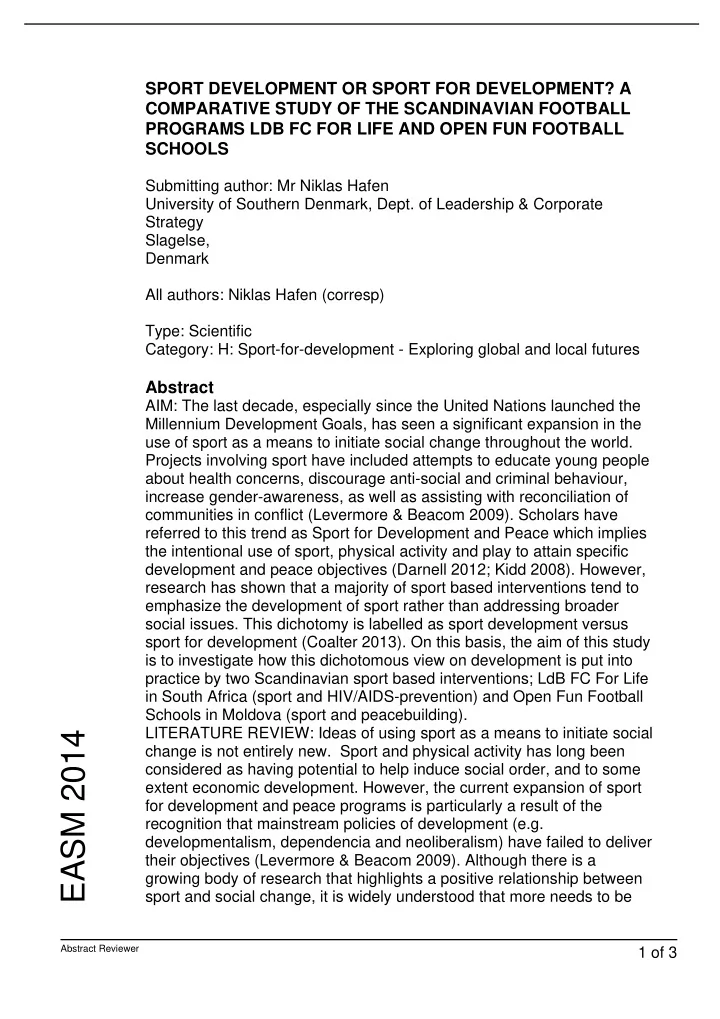

SPORT DEVELOPMENT OR SPORT FOR DEVELOPMENT? A COMPARATIVE STUDY OF THE SCANDINAVIAN FOOTBALL PROGRAMS LDB FC FOR LIFE AND OPEN FUN FOOTBALL SCHOOLS Submitting author: Mr Niklas Hafen University of Southern Denmark, Dept. of Leadership & Corporate Strategy Slagelse, Denmark All authors: Niklas Hafen (corresp) Type: Scientific Category: H: Sport-for-development - Exploring global and local futures Abstract AIM: The last decade, especially since the United Nations launched the Millennium Development Goals, has seen a significant expansion in the use of sport as a means to initiate social change throughout the world. Projects involving sport have included attempts to educate young people about health concerns, discourage anti-social and criminal behaviour, increase gender-awareness, as well as assisting with reconciliation of communities in conflict (Levermore & Beacom 2009). Scholars have referred to this trend as Sport for Development and Peace which implies the intentional use of sport, physical activity and play to attain specific development and peace objectives (Darnell 2012; Kidd 2008). However, research has shown that a majority of sport based interventions tend to emphasize the development of sport rather than addressing broader social issues. This dichotomy is labelled as sport development versus sport for development (Coalter 2013). On this basis, the aim of this study is to investigate how this dichotomous view on development is put into practice by two Scandinavian sport based interventions; LdB FC For Life in South Africa (sport and HIV/AIDS-prevention) and Open Fun Football Schools in Moldova (sport and peacebuilding). � LITERATURE REVIEW: Ideas of using sport as a means to initiate social EASM 2014 change is not entirely new. Sport and physical activity has long been considered as having potential to help induce social order, and to some extent economic development. However, the current expansion of sport for development and peace programs is particularly a result of the recognition that mainstream policies of development (e.g. developmentalism, dependencia and neoliberalism) have failed to deliver their objectives (Levermore & Beacom 2009). Although there is a growing body of research that highlights a positive relationship between sport and social change, it is widely understood that more needs to be Abstract Reviewer 1 of 3
done to fully understand this relationship and the impact that sport can have (Levermore & Beacom 2009). Furthermore, the dichotomous relation between development in and through sport must also be critically examined. In this respect, there is a big discrepancy between what sports based interventions exercise in theory and what they to do in practice (Coalter 2013).� RESEARCH DESIGN: The study makes use of an ethnographic methodological approach (Denzin & Lincoln 2013). On this basis, semi- structured interviews with the administrative staff of LdB FC For Life as well as Open Fun Football Schools have been conducted. Furthermore, both program´s practical implementation have been observed on site in South Africa and Moldova. Six administrative staff members from each sport program were interviewed in a period between June, 2011 and July, 2013. In addition, interviews with three football instructors from the two programs were interviewed on site in South Africa and Moldova, in a period between February, 2012, and July, 2013. While the interviews with the administrators focused on topics related to the overall objectives of the two football programs, the interviews with the instructors focused more on the program’s executive sides. The aim of this methodological course of action was thus to highlight potential differences between the theoretical and practical implementation of the programs. This possible discrepancy would in turn be useful in order to elaborate on the dichotomous relationship between sport development versus sport for development (i.e. what the initiators behind the programs say they do and what is actually being done in practice). � RESULTS, DISCUSSION, IMPLICATIONS: This paper represents work- in-progress. The preliminary outcome from the interviews and the observations shows that there is a discrepancy between what the two programs exercise in theory and what they tend to do in practice. Even though both programs strongly emphasize the use of sport (football) as a means for various societal objectives, they nevertheless tend to focus more on sport in itself. On this basis, the result shows that both programs tend to put an emphasis on the development of a well-established league for women´s soccer rather than the proclaimed developmental objectives (i.e. HIV/AIDS-prevention and peacebuilding). In addition, the results show that both programs make use of their activities as a good venue to find and develop new talented football players. These findings add weight to the assumption that LdB FC For Life as well as Open Fun EASM 2014 Football Schools embodies a nature of sport development rather than sport for development. This empirical fact is particularly interesting to highlight since both programs strongly position themselves within the sport for development and peace sector. Furthermore, the results show how the dichotomous relationship between development in and through sport, as presented by the research, comes into practice by the two sport examples given. References Abstract Reviewer 2 of 3
Coalter, Fred (2013) Sport for Development: What Game Are We Playing? London: Routledge � Darnell C. Simon (2012) Sport for development and Peace. A critical sociology. London: Bloomsbury Academic.� Denzin K. Norman & Lincoln S. Yvonna (eds.) (2013) The landscape of qualitative research. Los Angeles: SAGE� Kidd, Bruce (2008) “A new Social movement: Sport for development and peace”, Sport in Society, Vol. 11, No. 4. � Levermore, Roger & Beacom, Aaron (eds.) (2009) Sport and international development. Basingstoke: Palgrave Macmillan. EASM 2014 Abstract Reviewer 3 of 3
Recommend
More recommend